Bosnia journal
2023, Part IV: Krajina; More on Gaza; Evironmental Activism
Krajina
Prijedor
municipality is one of the centers of the greatest amount of refugee return in
the Republika Srpska. I visited my old friend Emsuda, a leader in the nearby
community of Kozarac. She brought me up to date on events there, but things have
not changed much since my previous visit. People are still leaving, and I had
noticed some years ago that more and more shops are closed. Saturday night is
not any more lively than any other night. I visited the outdoor market on
Thursday morning, and there was somewhat of a crowd of people there, but there
were only a few under 50 years of age.
When I talked to Srđan
Puhalo a couple of days later,
he described Kozarac thus: "Kozarac is two different towns, depending on whether
it's summer or winter. In the summer the place becomes crowded with people who
grew up there, and are back in their rebuilt homes to enjoy the relaxation and
the reunion, and to commemorate the summertime war anniversaries. Far fewer
people are there during the winter. Those who are coming back for vacation are
now getting older, and the younger people will spend their month's vacation at
the sea, or somewhere else."
I asked Emsuda how the economy was faring in Kozarac. She said that the retired
people who worked abroad and returned have good pensions. People who still live
abroad send money. There are some small businesses started by returnees. The
government insists that each one have a Serb employee, according to Emsuda. And
it throws up other hoops for employers and business people to jump through, as
before.
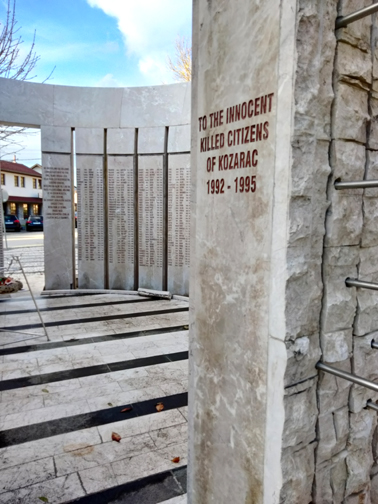
In the center of
Kozarac: memorial to the victims of ethnic cleansing
In the course of conversations with my friends in the Krajina there was much
discussion of President Dodik, his near-constant threats of secession, and his
high-end thievery. Most people I talk to think that Dodik will never actually
push ahead with secession. But there is the danger of saying "never," and
Bosnians are aware that many made that mistake before, and regretted it.
In some ways, the Republika Srpska has long since been politically and
culturally separate from the Federation. Mr. Puhalo, a social psychologist by
profession, says that in his children's school, there is nothing about Bosnia in
the curriculum. There are no Bosnian flags to be seen on the streets nor at
institutions. "Younger people aren't taught to love Bosnia," according to Puhalo,
"nor do they look up to the West. They go to work there, but their hearts are in
the east, with Russia." In Banja Luka I saw pro-Russian graffiti: "Slava Rossii."
The West, and the EU, he says, are a disappointment, and younger people are
looking at the east as an alternative.
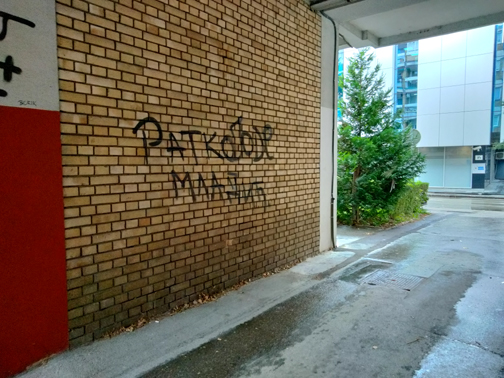
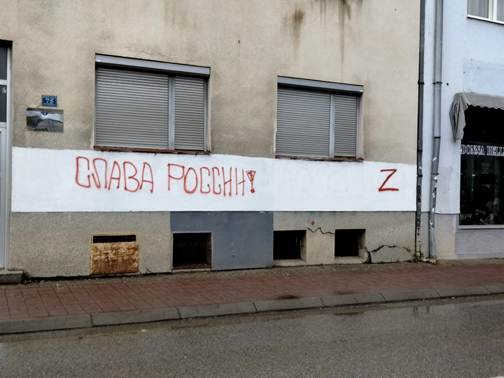
Graffiti in Banja Luka commemorating Ratko Mladić
"Slava Rossii" (Glory to Russia)
It takes a pretty extreme situation to make people loyal to Russia. In the
RS, the ruling party's policies keep people indoctrinated, with near-full
control of the media, and many other, performative, means of instilling loyalty.
One manifestation of this is the increasing number of physical attacks on
non-Serb returnees to the entity.
Puhalo said that for the Serbs in this area, "there is no such thing as Bosnia.
It's just a 'necessary evil,' according to Dodik. And Serb and Croat
nationalists aren't the whole problem; there are also Bosniak nationalists who
want Bosnia to be all theirs." Puhalo was not referring to a small number of
Vehabi (fundamentalists), but also a lot of "pro-Bosnia" Bosniaks.
I asked Mr. Puhalo what he thought about a statement by another friend of mine,
who said that the RS is "under occupation." He said, "That sounds nice, but
people voted for the present government." I asked if there is democracy in the
RS. He said, "Not really; they play at democracy." Dodik's party, the SNSD, has
just about everything sewn up. In Banja Luka and in Bijeljina the opposition has
the mayor's office, but the SNSD controls the local parliaments.
I heard a different evaluation of RS Serbs and their attitudes from Amir, who
lives near Prijedor. For the most part he is at ease with Serbs, saying, "I
believe deeply that the majority of humanity is good, and noble."
Dodik is skilled at raising and lowering the level of tension in Bosnia, and at
least once a year people start to say there's going to be a war. Foreign
commentators who see things from afar proclaim a crisis, perhaps not realizing
that there's been one long crisis ever since the Dayton agreement cemented
ethno-nationalist tensions in the political infrastructure.
Dodik's skilled manipulation of tensions is part of the political behavior that
keeps people on edge, and pushes Serbs in the RS to believe their entity does
not belong in Bosnia. But Amir says, "I
don't see that ordinary people are inclined towards having a war again. Among
the majority of Serbs, they don't want to talk about a war. In the 1990s, yes,
they wanted it. But now, everyone wants to leave."
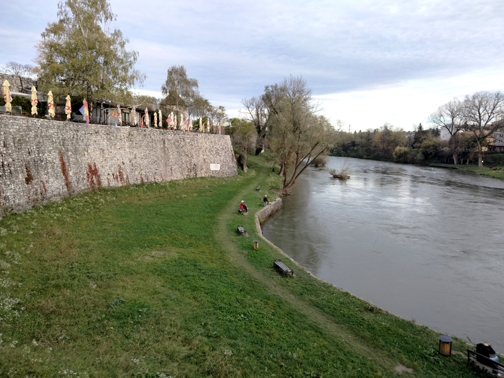
The ancient
Kastel fortress by the Vrbas River, Banja Luka
People I
visited are debating whether to leave, and when to do so. Alma believes that
Dodik will indeed make a move to secede in a couple of years, and then it will
be time to emigrate. She laments the fact that her return community has already
almost completely left for places in western and central Europe. She asks,
"Which is the lesser evil, being a foreigner forever, or remaining here, alone?"
Amir discusses the same problem: "In Germany, there's no love among families,
only neo-liberalism that calculates how much everything costs. All is for
profit."
Discussing the possibility of Bosnia joining the European Union, he says, "I
want to see this country in the EU and NATO, but I ask what the possibilities
are for us to be part of Europe. There is a pull towards Germany, which needs
400,000 new workers per year. But there are problems that create
Euro-skepticism. And here, we have Russophilia, and Turcophilia. "That
Turcophilia is unfounded, because we never loved Turkey. We are a European
people, Slavs who adopted Islam. But the European lack of attention to us
worries me. If Russophilia and Turcophilia are nurtured so intensively, where is
Europhilia? Why not work on that? Why not work on the political adaptation?
People should understand that that can save us.
"But let's be real about it. Europe is still a space where people are
privileged. Those are people who live a comfortable life."
Amir compared the
economic situation in Serbia to that of Germany. In Serbia, the average wage is
around 330 euro per month; "In Germany, a convict in prison earns 520 euro per
month. So it's a privilege live in a German prison."
There's an abundance of irony in Eastern Europe, and Amir brings up the
phenomenon of migrant labor in Bosnia replacing the young work force that has
left: "There is now a problem of lack of a work force here. So Turks, and people
from Bangladesh and Nepal, are coming here to work. What an irony! Turks are
selling ice cream here, with signs on their stands in Turkish. Before, the Serbs
were cursing our 'Turkish mothers' when they were expelling us. Now I walk
around Banja Luka, and in the background you hear Turkish music. It's crazy."
"Now the planet has become a big village," Amir concludes, "but it has become a
big rural village."
A village is not the motor of a modern national economy, and in
Bosnia-Herzegovina, even agriculture is in a beleaguered state. Earlier, I had
mentioned to Senka my impression that the economy of Srebrenica, which has great
potential, was intentionally held back. She
pointed out that
it's the same everywhere. In the eastern Bosnian town where her parents live,
they
only receive a pension of 250 euro. There is no work to be had. Senka says that
the political situation is worse than ever, and the politicians don't want to
promote development, only self-enrichment. She, like everyone else, says
that "it's just
not in their interest to let the economy move."
I mentioned this discussion of Srebrenica in my visit with Srđan Puhalo, and he
disagreed with Senka, asking, "Do you think this was not planned?" I agreed with
him. Still, the economy is dying all around the country. But Puhalo says that in
Srebrenica, "capitalists would find a way to break through the conflict and
competition, to make things work. But the politics override that consideration,
and compound the problem. In a way, the lousy economy is a 'win-win' situation:
it works out well for Europe, because they need workers, and for the leaders
here it works out as well, because the dissatisfied people leave, and the
satisfied people stay."
One of the ways that government policies hurt the Bosnian economy is in favoring
import over local production. We saw that Nermina and her brother were forced to
sell their cows, because feed cost more than they were able to earn from the
milk. In Kozarac, Tarik gave me an update on Jusuf
Arifagić's cow farm, the largest one in the country. Arifagić is a survivor of
one of the local concentration camps, and he moved to Norway upon his release.
He came back from life as a refugee in Norway after the war, having learned how
to raise cattle, and he started a farm for milk cows. Now it's the biggest
one in
Bosnia.
However, the government subsidizes milk producers only up to a certain amount,
and
Arifagić's farm goes over that amount—the only farm in the country that does. So
he doesn't get as much of a subsidy as the other farms, and that affects his
finances.
Tarik explains that since it costs the Republika Srpska to support domestic
cattle farming, they would rather import the milk, because then they get tariffs
paid into the budget, rather than paying out money.
Much has been said about economic problems in the Republika Srpska, especially
when the subject of secession comes up. While the entity is culturally and
politically independent, two problems would hamper economic viability. One is
that an important amount of its income stems from
the percentage it
receives on all of the country's 17% value added tax income. One friend in
Prijedor commented that the best situation for Dodik would probably be for the
entity to remain in limbo, rather than seceding.
The other problem is that the Republika Srpska is in debt, far moreso than the
Federation. The RS has borrowed massive amounts of money and sold bonds on
various markets in order to pay government employees and stay afloat. Those
loans must be paid off. The RS is in trouble because of these debts, although
Dodik and his colleagues regularly claim that the entity is much more solvent
than the Federation.
The RS would be better off if it weren't for the corruption that compounds its
insolvency. The entity's leader is out front in embezzlement, nepotism, and
graft, with his fingers in many branches of the economy. When Dodik returned to
the office of RS presidency after the 2022 elections, he immediately quadrupled
the budget of his office, to $28.7 million. He has also persistently sought
loans from friendly countries including Russia and Hungary—and has more recently
taken to pressuring local banks for financial support. In addition, he has been
selling off or renting property that he has no legal claim to, as it is state
property whose resolution has not yet been settled. [1]

"Cafe Putin" in
the center of Banja Luka
How long such dodgy maneuvers can keep the Republika Srpska from defaulting is a
good question. Meanwhile, the US Treasury office keeps an eye on the entity, and
it has laid economic sanctions on Dodik (twice) and several other high RS
officials—not only for economic malversation, but also for threatening the
stability of the country.
The ordinary citizens of the Republika Srpska are paying for their leaders'
dishonesty and irresponsibility, and when the bill comes due, it will be steep.
Some of the citizens know it; in late October of 2023 Dodik
was visiting a kindergarten. The children started yelling
at him, "Đe
si lopove? Lopov, lopov!!"—What's
up, thief? Thief, thief!! A clip of this was shown on Instagram, but it was
taken down shortly thereafter.
My friend Tarik mentioned to me that he was going to go from Kozarac
across the entity boundary to Sanski Most in the Federation, and I asked how
things were there. He said that "everywhere
you go in Bosnia,
you feel like there are fewer people than before, and less life, with the
possible exception of Sarajevo and Banja Luka. The atmosphere is better in
Sanski Most, since it's in the Federation—but they are thieves there, too."
Looking at the more global picture of corruption and insecurity in Bosnia,
analyst Kurt Bassuener of the Democratization Policy Council said to me that
Dodik's polarizing narrative of threats and secession can be taken away from
him, taking the wind out of his sails so that he can be "laughed out of the
room," as Kurt put it. But, he said, the international community cannot be the
force that makes that big of a change in Bosnia; it has to be led by ordinary
people.
People know what they are up against, Kurt said: "This is the only place I know
of where everyone knows they're being had, but they're still scared. Everyone
can tell you about all the rackets. But it is so overwhelming that everyone just
feels resigned. In order to create a civic society, there has to be a way to get
people to identify as such, which they have not done for decades—if ever."
Regarding neutralizing Dodik, my friend
Ismet says that there is no real power that can stand up to Dodik in the RS. If
Dodik were replaced, it would take 15 years for anyone else to develop the power
that he has. But the RS opposition figures "are not really that interested in
leading the country, and the only thing that could get Dodik to tone things down
and cooperate would be more serious sanctions. Dodik was able to steal the last
elections because he had the money to pay people to commit the fraud—burning
ballots, forging them, etc."
Ismet
further says that Dodik has an "endgame": to secede. I responded that you also
have to have a strategy to get there, and I hadn't witnessed that Dodik had a
strategy. I'm not convinced all his talk about secession isn't the strategy
right there, that is, that it's just a manipulation to create tension. Ismet
also asserted that the US has no endgame or strategy. I said that its strategy
is "stabilocracy," which is not much of a strategy, and obviously not a
long-term one. Ismet thinks that the US has faltered and lost its vision.
The US and the European Union continually advocate for rule of law in
Bosnia-Herzegovina and for the country's accession to the EU. But in the last 15
years and more, this kind of advocacy has really mostly been empty words. At
present—since Russia's full-scale invasion of Ukraine—the EU has been pushing
harder for Bosnia to shape up some of its dysfunctional aspects, pursuant to an
early shot at negotiations for membership. There has been some movement on that
score, but there has also been an escalation in the customary political sniping
at each other. This is just another illustration of Dayton's chaos that keeps
the profiteers in power.
There is also encouragement of old nationalist, separatist impulses from
Croatia, Serbia, and Russia.
I asked Mr.
Puhalo what Russia wants in Bosnia. He answered, "Bosnia is like an ulcer on the
skin of the West, a constant problem, a source of destabilization. Russia cannot
invade Bosnia, because Bosnia is all but surrounded by NATO members. But Russia
can, and does, continually work to destabilize the country."
Gaza again
Among my friends
in the Krajina, the question regularly turned back to Gaza. Amir commented that
"what Hamas did was in the least interest of the Palestinian people;
now the Israelis are coming in with parachutes and tanks. And here in Bosnia,
people are witnessing that violence in an emotional way, especially since they
are attacking civilians. I know what this means myself, since I lived through
it." Responding to the pro-Palestinian demonstrations that have been taking
place around the Federation, Amir echoed Tarik, saying, "People in the
Federation never gather in those numbers for our own problems here in the
Republika Srpska. When did they
protest on our
behalf? That's what makes me worry, with the Bosniaks."
People were of one voice in expressing how much damage the US support of
Israel's attacks on Gaza has done. Ismet said to me, "It's a huge gift to
Russia," taking world attention away from its atrocities in Ukraine. He asked
me, "What is the condition of American influence at the edges of its empire?" To
me, it looks like chaos and a lack of vision—the same problems of any
over-extended empire has had, ever since the Roman one if not earlier.
Ismet also worried that with Israel's assault on Gaza, the impact of
international law is ever lighter, so that "anyone can do anything; anyone can
get an atom bomb and carry it around," he said.
Coming back to the situation in Bosnia, Mr. Puhalo was just as gloomy: "There's
no potential here for a democratizing movement," he said, "people are too
preoccupied with surviving. They will fight for environmental protection,
because the pollution affects them directly." When I asked about the LGBT+
movement, he said, "That's something you have in the West, but here, people are
too concerned with more basic matters of survival to create a movement around
gay issues. And all the NGOs are organized from the top; that is, they are
supported by foreign foundations, not organized by the grassroots. So you don't
have the potential for a movement."
In closing, Puhalo said that "Bosnia is a big park with six or seven geriatric
centers," and he listed off the names of the main cities. "We are all
distraught."
Renewed
activism and a sign of hope—after all
Bosnia was always
a big park, an astonishing place of beautiful green mountains, hundreds of
rivers, lush forests, and fertile grounds. The resources contained within this
heart-shaped land are of great interest to Europe and the world, and the
corporations are coming. That is, mining companies have been setting up their
projects of exploration and extraction in the hills and the forests of the
country.
Powerful corporations represented by powerful diplomats are vying for access to
lithium, copper, nickel, lead, and much more. They are also building
hydro-electric dams and wind farms in all the wrong places, their contracts
mediated without input from local communities that are affected. The poisoning
of the rivers and underground waters is underway. Clear-cutting of pristine
forests and dumping of waste in the creeks are underway. Biodiversity in special
habitats is endangered.
That is not the end of the story. Ordinary people know their rights, regardless
of their education and their station. They are mobilizing, and have been for
years, in many places around the country—as many places as there are industrial
assaults on the environment. The potential for a widespread movement is the most
promising that I have witnessed in Bosnia-Herzegovina since the drive for
refugee return in the late 1990s. The most encouraging thing is that people are
collaborating and organizing across entity boundaries and between ethnicities,
because a poisoned creek recognizes none of those borders.
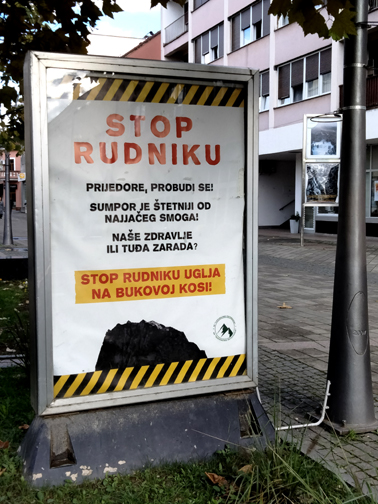
Sign seen in
Prijedor:
"Stop the Mine--Prijedor,
wake up! Sulfur is worse than the strongest smog"
The movement is still small and fragmented, but it has potential. The danger
comes from the domestic leaders, who are quite content to rent their land to the
highest bidder, regardless of the permanent damage it will do. And those
leaders, as they have done many times before, can pay people to set the
activists off against each other and to promote ethnic tension as a distraction.
That is the obstacle that people must combat.
I have introduced this matter here as a teaser, because it is an issue that I'm
just getting involved in. Stand by for more information on environmental
resistance in Bosnia-Herzegovina in my blog entries (here)
and other articles.
[1] "O‘Brien je spomenuo samo tri imena" (O'Brien only mentioned three
names), Sarajevo daily Oslobodjenje, February 2, 2024.
Journal 1:
To Bosnia from Ukraine;
Visiting Srebrenica; Memorial Center
Journal 2: Sarajevo: Bistrik; Looking for Kazani
Journal 3: Gaza in Bosnia; Sevdalinka; Azra
Zornić
Journal 4: Krajina; More on Gaza;
Environmental Activism